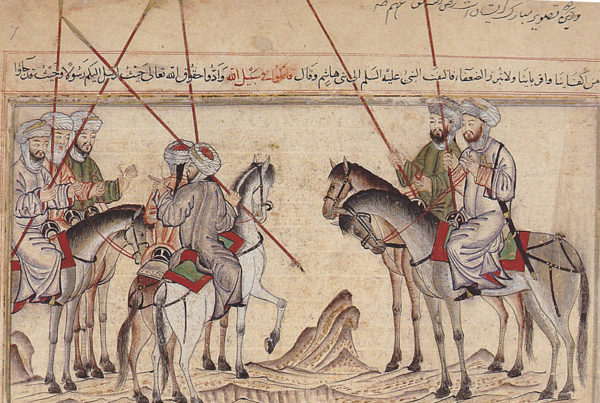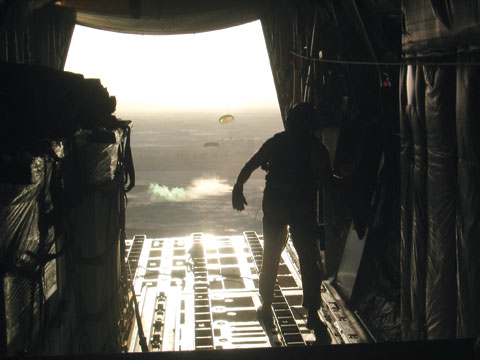 The Modern Mercenary is both enlightening and disturbing as it underlines that private armies have become a logical option for governments over the last few decades. The reappearance of mercenaries, or more aptly entitled “armed security consultants” or “military contractors”, in the 1990s witnessed a dramatic expansion particularly in the wake of the invasions of Afghanistan and Iraq demonstrating a governmental appetite for commercialized military force.
The Modern Mercenary is both enlightening and disturbing as it underlines that private armies have become a logical option for governments over the last few decades. The reappearance of mercenaries, or more aptly entitled “armed security consultants” or “military contractors”, in the 1990s witnessed a dramatic expansion particularly in the wake of the invasions of Afghanistan and Iraq demonstrating a governmental appetite for commercialized military force.
McFate, provides the reader with a historical overview and the evolution of mercenaries, noting that it was once considered a respectable but violent trade acknowledging that it was routine to hire mercenary forces to wage war. He notes that Xenophon, Carthage in the Punic War, as well as Hannibal, Alexander and Rome all incorporated mercenary forces. He then takes the reader up to modern times, making the argument that we are entering a neo-medieval period of private armies and contract warfare. McFate uses a number of instances that illustrate the successful application/employment of commercialized forces particularly dedicating a chapter on how the U.S. State Department hired two Private Military Companies (PMCs) to select, recruit, train and equip the Liberian Army which turned out to be a recognized success. He dedicates another chapter on the employment of PMCs in Somalia particularly to deal with protecting maritime commerce but also to train port security, police and in one case build Somaliland’s antipiracy coast guard.
The author proffers one poignant example that forces the reader to reflect upon the utility of PMCs. His example consists of one PMC, known as Executive Outcomes, which was a formed group of military contractors drawn from some of South Africa’s highly professional and combat proven special forces. It was this PMC that sought an audience with Kofi Annan, then head of the United Nations (UN) Department of Peacekeeping Operations, offering to quell the 1994 genocide that Rwanda was experiencing. This private military company (PMC) proposed conducting a humanitarian intervention in order to arrest the rapidly evolving genocide. This timely intervention was aimed at providing the UN the time to plan a follow-on peacekeeping mission. Executive Outcomes’ scheme was to have their contractors on the ground in 14 days, followed by a fully equipped brigade-sized element of some 1,500 contract personnel accompanied with their own integral air and fire support six weeks later. The plan incorporated the establishment of security islands and refugee safe havens in the region for a cost of approximately $600,000 per day over a six-month period. The cost for this intervention was estimated to be $150 million. In comparative terms this was inexpensive to normative UN peace-keeping prices. This offer was refused by Annan, who later stated “the world may not be ready to privatize peace.” As McFate states, “the world was also not ready for genocide, which killed more than 800,000 people in approximately 100 days, making Annan’s Westphalian sentiment an expensive ideology. By the time the UN Assistance Mission for Rwanda (UNAMIR 11) arrived in Rwanda, it was too late, they cost more than five times executive outcomes estimate for its own operation.”
There is a schizophrenic aspect to PMCs and contract soldiers that McFate is understandably concerned with and duly surfaces. Firstly, PMCs and their mercenaries can be viewed as a more cost-effective and, depending upon geographic realities, more rapidly deployable force than traditional, conventional military forces. As such, their deployment times could address pop-up crises as witnessed during the Rwandan Civil War. This positive however, can be countered with the negative, as PMCs are business-oriented and essentially conduct operations for profit. This has its own complications because if there is a recession or an “industrial slump,” unemployed soldiers of fortune, like many businesses, can formulate ways to create a demand for their services. In the wake of the 30 Year War, the subsequent Treaty of Westphalia in 1648 sought to ensure that only nation states had the monopoly to wage war, which had previously been conducted by private armies, various religious organizations and military orders, as well as nations. Today, McFate argues, centuries after acceptance of the Treaty of Westphalia, this reality has dramatically changed, arguably due to globalization and the explosion of nongovernmental organizations. There is also a spectrum of rich and politically powerful multinational corporations, some larger than many nations, not to forget the challenges provided by terrorist groups and other non-state actors that make the employment of PMCs by both government and multinationals a logical option.
The power of states has been diminishing, according to McFate. He posits that modern technology and globalization provide the opportunity for communities to span time and space. Media in the form of television, Internet, twitter and the like can make events immediate and visceral to the population in both domestic and international terms. Hence, the difficulty for states to control their respective populations. The Arab Spring is just one manifestation of this reality. The September 2015 photos of Aylan Kurdi, the three year old Syrian refugee who drowned trying to cross into Greece, are a case in point.
McFate infers that there are a number of aspects that ensure the continuing utilization of mercenaries and private military companies, citing the United States military overextension, the business trend to employ outside resources, as well as the acceptance of contracting almost every governmental function, facilitating the argument for and the continued employment of PMCs. Notwithstanding, McFate is concerned about the failure of the international community to successfully produce regulations to rein in PMCs. He contends that the UN should develop a thorough vetting and licensing regime to set standards for the PMC industry and how they conduct themselves.
The book is a valuable addition for those who are interested in military and security contracting, as well as those who focus on issues of national defence and international security. McFate adds to the important discourse on how to shape this evolving industry while providing a sobering contribution to the debates regarding the best use of PMCs, as well as their cost-effectiveness. As a former paratrooper, a former military contractor and now an academic, McFate provides the reader with a unique view, drawing on his personal experience to provide reliable insights. McFate has provided a highly readable and well-sourced study on contemporary PMCs and what they represent both now and into the future. This is an informative, highly recommended book.








